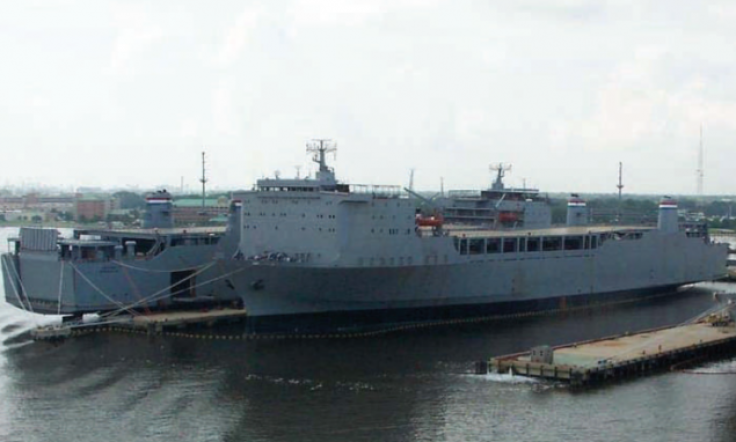Voyage Of The Damned: U.S. Ship Carrying Syrian Chemical Weapons Not Welcome In Some Italian Ports, Despite Rome’s Pledge To Allow Destruction Of Arms

Despite opposition from some local officials, the Italian government said it will allow one of its ports to be used as a transfer point for a U.S. vessel that is carrying dangerous chemical weapons -- including mustard gas and components of sarin gas -- taken from Syria. The Gazzetta Del Sud newspaper reported that the identity of the Italian port in question will be confirmed on Thursday after parliament in Rome discusses the matter with the director-general of the Organisation for the Prohibition of Chemical Weapons (OPCW), Ahmet Uzumcu.
According to reports, the weapons, which Syrian dictator Bashar al-Assad agreed to relinquish, would subsequently be destroyed near the port, in international waters. Reuters reported that the “neutralization” process would take no more than 48 hours. The Wall Street Journal reported over the weekend that a Danish vessel is docked at the Syrian port of Latakia, awaiting the shipment of a total of 560 metric tons of chemical weapons from parts of Syria. Reportedly, another 500 metric tons will be destroyed by commercial businesses in various other nations. Weapons experts concluded that destroying the weapons cache in Syria itself would be too dangerous given the chaos of the civil war already ravaging the country.
The Gazzetta del Sud noted that the transfer of the chemical weapons -- from the Danish ship to an American vessel, the MV Cape Ray, then to an unnamed Italian port -- will occur in phases at the end of January. Inspectors from OPCW will monitor the transfer and examine the materials once they have been moved onto the US ship. Italian media has speculated that Brindisi (in Apulia, on the coast of the Adriatic Sea); Taranto (in Apulia as well but on the Ionian Sea, and the site of a major naval base); Augusta (on the east coast of Sicily); Gioia Tauro (in Calabria); or Cagliari (in Sardinia) are the likely ports that would host the transfer of the weapons.
Italian Foreign Minister Emma Bonino, who attended a meeting in Paris over the weekend of the Friends of Syria Group, said that the choice of the port would depend on technical criteria, including port depth and distance from densely populated city centers -- “which were requested and which the infrastructure minister is evaluating.” "We want the whole process to be managed in full transparency," an Italian foreign ministry spokesman said of the operation.
Meanwhile, Bonino will meet with Uzumcu on Thursday and then discuss Italy’s role in the Syrian weapons transfer and delivery program before the Italian parliament. Uzumcu is also expected to provide details of the weapons eradication before the parliament.
However, the proposed chemical weapons transfer faces harsh resistance from some local Italian municipalities. In November, when Russia and Western states reached an agreement with Damascus for the removal of its chemical weapons (following threats of an U.S. air strike on Syria), a number of European states, including Norway, Belgium and Albania, refused to serve as the site of the destruction of the arms. Italy agreed to host the process last month, triggering protests and denunciations of the plan in certain coastal cities, citing the inherent environmental risks. ["Using an Italian port as a weapons transfer point] is a hypothesis that we reject with anger and shock and we will fight it in any possible way," the regional governor of Sardinia, Ugo Cappellacci, wrote in a letter last month to Italian Prime Minister Enrico Letta. The mayor of Brindisi has also vowed that he will not allow his port to be used as a staging area for the weapons' transfer and destruction.
Bonino has assured however that no weapons will touch Italian soil. But environmentalists also fear what would happen if the U.S. ship carrying the chemicals finds itself in bad weather at sea.
© Copyright IBTimes 2024. All rights reserved.











